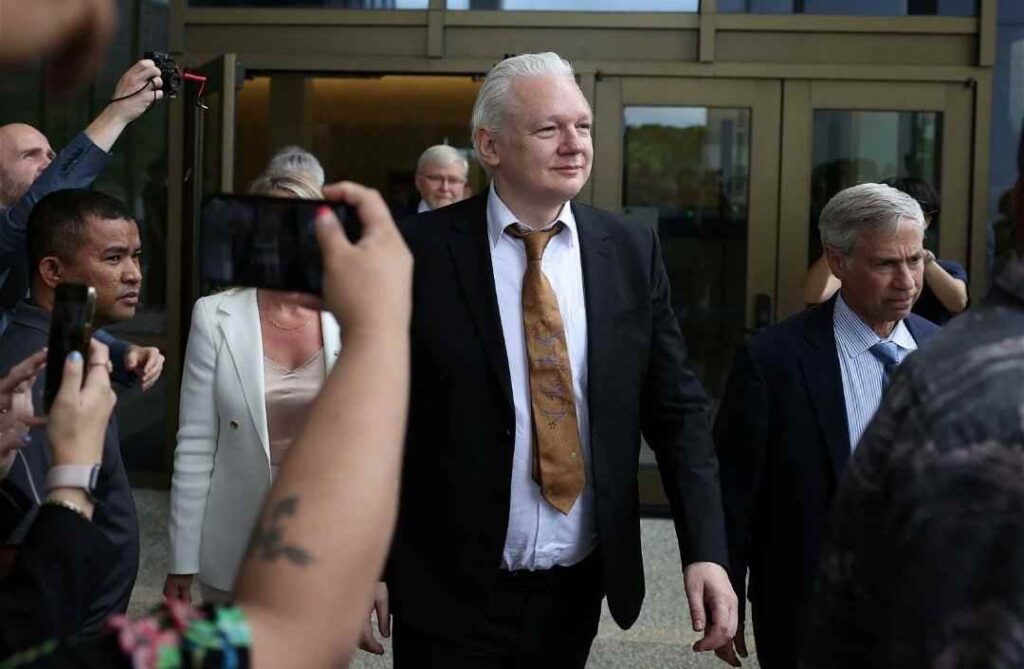Chief Judge Ramona Manglona ruled that Julian Assange’s 62 months in Belmarsh Prison, U.K., was sufficient punishment.

WikiLeaks founder Julian Assange emerged from a lengthy court hearing on Wednesday as a free man, following his guilty plea to a felony charge under the Espionage Act.
Assange, 52, renowned for releasing classified military and diplomatic documents in 2010, appeared in federal court in the Northern Mariana Islands, a U.S. commonwealth. His release was conditional on him leaving the commonwealth immediately.
Also Read:- Jury Recommends Death Penalty for Wade Wilson in 2019 Murders
Julian Assange is ‘free man’ now
Chief Judge Ramona Manglona ruled that Julian Assange’s 62 months in Belmarsh Prison, U.K., was sufficient punishment. “I’m sentencing you to time served,” she declared, expressing confidence that Assange would adhere to the plea agreement.
This decision concluded a protracted legal ordeal for Assange, who had previously sought refuge in the Ecuadorian embassy in London for years before being imprisoned in the U.K. He is anticipated to return to Australia following these proceedings.
During the hearing, Assange explained his actions: “As a journalist, I encouraged my source to provide what was considered classified information to publish it. I believed this was protected under the First Amendment.” He acknowledged the tension between the First Amendment and the Espionage Act but accepted the plea as a practical resolution.
Julian Assange, dressed in a black blazer, white shirt, dress pants, and gold-beige tie, remained composed throughout the hearing, interacting minimally except with his counsel and displaying a measured tone. He even displayed a touch of humor when responding to the judge’s inquiry about his satisfaction with his legal representation, sparking courtroom laughter.
Under the plea deal, Assange’s 62-month sentence, equivalent to his time served in Belmarsh Prison, was deemed fulfilled. He was also instructed to ensure WikiLeaks destroyed any classified material, though the prolonged duration of the case likely minimized the impact of this action.
Also Read:- Elon Musk and Neuralink Executive Shivon Zilis Welcome Third Child, Musk’s 12th Child
A federal grand jury in Virginia indicted Assange in 2019 on charges of espionage and computer misuse, marking one of the most significant breaches of classified information in U.S. history. The indictment alleged Assange conspired with then-military Private Chelsea Manning to obtain and publish secret reports on the Afghanistan and Iraq wars and sensitive U.S. diplomatic communications. Prosecutors accused Assange of failing to redact sensitive information, endangering informants and others.
Manning, arrested in 2010, served seven years before her sentence was commuted by President Barack Obama.
Assange’s case has garnered support from human rights and journalism organizations, including Amnesty International and the Committee to Protect Journalists, who fear the Espionage Act charges could set a precedent for prosecuting journalists for national security offenses.
Julian Assange’s journey through the legal system has been convoluted. He spent seven years in the Ecuadorian embassy in London avoiding sexual assault allegations from Swedish officials, which frustrated both him and his hosts. Swedish authorities eventually dropped these charges, but U.K. authorities detained him for bail violations.
Also Read:- Saudi Arabia Reports Over 1,300 Deaths During Hajj Pilgrimage Amid Extreme Heat
The U.S. then sought his extradition, a process that dragged on for years. The plea agreement sidesteps further legal battles over his extradition, which had been scheduled for early July.
